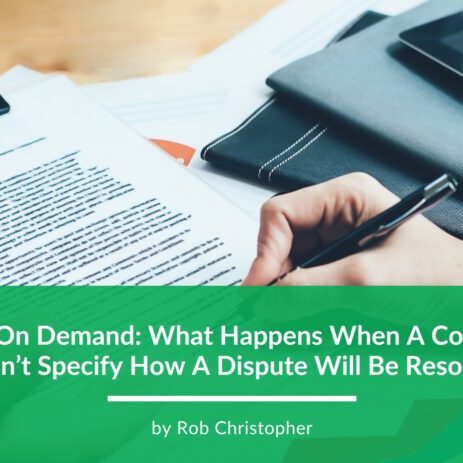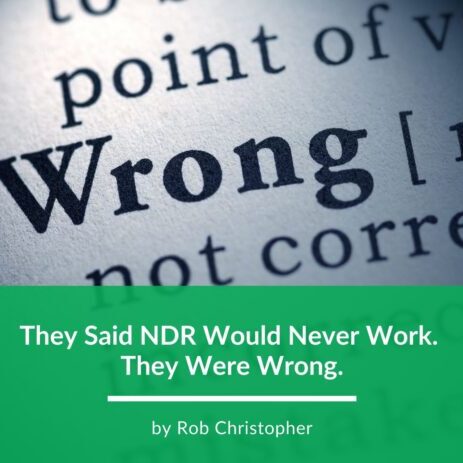Contract Disagreements, Failures, and Misunderstandings…What Are Your Resolution Options?

You suffer the irate voicemail, the missing payment, faulty product, unmet deadline, or an escalated service issue. One thing is always true: it involves a financial and reputational risk to your business and an interruption of operations. The failure, perceived or real, of one or both parties to meet the terms of an agreement have led to consequences for your business. Now what do you do?
The first step in a dispute is to know your options. Here is our list of the most common dispute resolution choices and when they make sense:
Litigation
Litigation is the process of taking a case to court. It usually involves a plaintiff, or the one who brings the case to court, and a defendant, the one against whom the complaint is brought. Litigation is an adversarial process, meaning that both parties retain attorneys who direct the process from beginning to end. Whichever party loses at the trial level may have rights to appeal to a higher court.
Time Involved:
Lengthy, open-ended and duplicative communications, maneuvering, information discovery, research, and advocacy cycles directed by the opposing attorneys. Parties wait for the case to be heard in court, ranging from several months to years
Cost associated:
Attorney fees typically range from $200 to $600+ per hour, and deposition and court costs run into thousands of dollars. Total costs are unpredictable in advance. In general, the more complex the case and the more aggressive the personalities, the higher the fees.
When it makes sense:
When the stakes are very high or complicated, such as a bet-the-company-case, when there are nonparties whose testimony or other evidence is critical and must be subpoenaed, when the right to jury trial seems important, and whenever the parties haven’t been able to freely agree to a more efficient process.
When it doesn’t make sense:
When it can’t deliver real justice because most or all of the stakes are likely to be consumed by costs, or when a prompt final resolution is a priority.
Arbitration
Arbitration is a private dispute resolution by agreement of both parties, where one or more arbitrators issue a binding or non-binding decision, often called an award, after an expedited discovery process and adversarial hearing, instead of going to court. Like litigation, arbitration is an adversarial process in which each party uses an attorney to direct the same cycles of activities described above. Unlike litigation, the parties also help select and pay for the arbitrator(s), and appeals generally are not available.
Time involved:
Usually less time than pursuing a court decision, but still lengthy and expensive in that opposing attorneys drive communications, maneuvering, research, information discovery and advocacy cycles.
Cost associated:
Attorney fees as above, plus thousands of dollars in arbitrator(s) fees at similar hourly rates.
When it makes sense:
When privacy is important, or when some cost and time savings are wanted but at least one party still wants lawyers driving the process.
When it doesn’t make sense:
When rights like jury trial and appeal are important, and, as with litigation, when the costs of adversarial process will eat up most or all of the stakes, or time to resolution is critical.
Mediation
Mediation is a facilitated negotiation process whose success depends on the parties voluntarily reaching a settlement.The neutral mediator has no decision-making authority, but tries to help the parties reach an acceptable resolution, usually compromised. Mediation too is an adversarial process, as the parties retain separate attorneys to communicate, maneuver, discover information, research and advocate their positions. The parties usually split the cost of the mediator, and mediations tend to be set in one-day sessions.
Time involved:
Almost always less time than court and arbitration. Mediation is often employed before arbitration or trial.
Cost associated:
Attorney and professional mediator fees for arranging, preparing for, submitting briefs, and attending the mediation, at similar hourly rates as for trial and arbitration work, plus some administrative fees. When mediation succeeds, its savings can be great, depending on where in the cycle it occurs. When mediation fails, it adds to total adversarial process costs in an amount roughly equal to the time invested in it plus the mediator’s fees and related expense.
When it makes sense:
When parties have been unable to initiate a productive dialogue, have reached a seemingly insurmountable impasse, and/or desire an economically rational resolution.
When it doesn’t make sense:
When it is unlikely that both parties will come to an agreement and so a binding decision is needed.
Just Resolve
Just Resolve is a neutral, private alternative dispute resolution service that uses a non-adversarial method to deliver a binding resolution, usually for a fixed total price.The parties agree to investigation and decision conducted by a neutral “Arbiter” and any needed neutral experts whom they help select. The parties may also choose to agree to an expedited mediation or appeal process.
Cost Associated:
Fractional cost compared with all adversarial methods, and the ability to set a fixed total cost per party at the outset of < ¼ of the financial stakes in dispute. This is enabled by eliminating the duplication of effort and cross-purposes of opposing sets of attorneys, and by recognizing the financial stakes in determining the work to be undertaken.
When it makes sense:
When a quick, fair resolution is needed so the parties can stay focused on business, when both parties want economically rational justice and realize that, given the stakes involved, adversarial process is unlikely to deliver it, or when other values besides winning at all costs (e.g., business partnering reputation, opportunity costs of lost productive time and money, truth focus, or peace of mind) drive both parties’ approach to resolution.
When it doesn’t make sense:
When litigation does make sense for the reasons given above.
No matter the size or simplicity of the business, contract disputes will arise at some time. How a business plans for and manages dispute resolution is likely to have real impact on profitability, reputation and peace of mind.
More to read
NDR on Demand: What Happens When a Contract Doesn’t Specify How a Dispute Will Be Resolved?
The best way to deter threats of litigation and minimize the costs, duration, and distractions of resolving any dispute is to put a dispute resolution clause specifying NDR — Neutral-Driven Resolution — in all your contracts BEFORE there is a problem. That means that if a dispute should arise between a business and a contractor,…
They Said NDR Would Never Work. They Were Wrong.
Many people are surprised by how effective NDR can be. Since publishing my book and speaking at events about NDR (Neutral-Driven Resolution), I’ve often been asked a simple question: Does it work? And if it really does lower the costs and the time it takes to settle common disputes, why doesn’t everybody know about…
“Morgan Hill author releases new book”
The Morgan Hill Times featured Rob’s new book in an article ahead of his “Meet the Author” night at Booksmart. “Legal disputes and conflicts cost businesses billions of dollars a year in lawyers’ fees, lost productivity, time and aggravation. A new book by Morgan Hill author Robert Christopher proposes an innovative, faster and simpler way…
Not All Disputes are Equal
Not all business and legal disputes are alike, and not all of them can be resolved in the same way. In writing my book Just Right: How Neutral-Driven Resolution Can Close the Gap in American Civil Justice, it was important to distinguish the types of common disputes for which NDR is most suitable. As readers…



